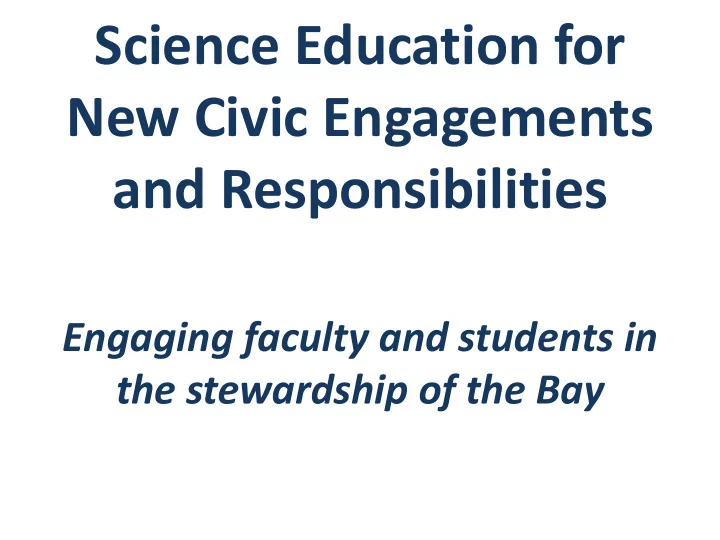

Science Education for New Civic Engagements and Responsibilities Engaging faculty and students in the stewardship of the Bay
SENCER Ideals • SENCER robustly connects science and civic engagement by teaching “through” complex, contested, capacious, current, and unresolved public issues “to” basic science. • SENCER, by focusing on contested issues, encourages student engagement with “multidisciplinary trouble” and with civic questions that require attention now. By doing so, SENCER hopes to help students overcome both unfounded fears and unquestioning awe of science.
Does it work?
Relevant organizational scales • National (and international) community of scholars – SENCER Summer Institute – Washington DC Symposium – Leadership Fellows • Nine regional Centers for Innovation – Regional meetings • College and University teams • Courses
Course Models • Environmental Biology: Ecosystems of Southwest Florida • Stem Cells and Social Justice • Living Systems: Global Concepts, Living Connections • Assessing Exposure to Toxic Chemicals: General Chemistry Applied to Human and Environmental Health • Undergraduate Biochemistry Through Public Health Issues • Food for Thought: Engaging the Citizen in the Science and Politics of Food Information, Food Consumerism, Nutrition, and Health • Introductory Statistics with Community-Based Projects • Life Science in Context: Sub-Saharan Africa and HIV/AIDS • Ordinary Differential Equations: Mathematics in Real World Situations • Pregnancy Outcomes in American Women • The Science of Sleep
Course Models Learning real science in context Critical dialog outside the classroom Engagement with the community
SENCER and STAC • Connecting interested faculty with CB resources? – Understanding the capacious public issues • Engaging students in real work? – CB Agreement? – Volunteer monitoring? – With local decision makers? – For outreach? – For their “pre -disciplinarity ”? • STAC connections with SENCER?
Pedagogical publication
Recommend
More recommend